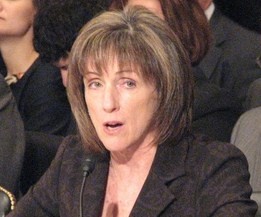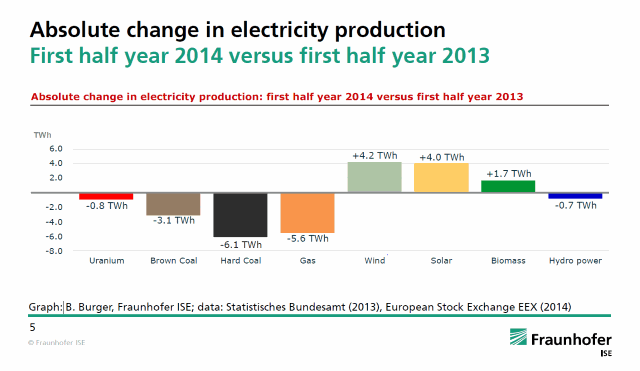
Former White House climate “czar” and now Nuclear Matters shill Carol Browner continues to embarrass herself with her ill-informed, although presumably lucrative, rants in support of nuclear power no matter its bevy of environmental, safety and economic failings.
One hopes that, if not Browner herself, at least the League of Conservation Voters (LCV), the nation’s most prominent organization supporting environmental candidates in elections, is embarrassed by Browner’s antics. After all, she is chair of the LCV Board, which always has been at least skeptical of nuclear power and certainly has never fallen to the level of uncritical support for the industry espoused by Browner.
Exhibit A is a speech Browner made Friday on Capitol Hill, in a Nuclear Matters-sponsored event for policymakers.
According to The Hill, “’I think climate change is the biggest problem the world has ever faced’,” Browner said. ‘Here in the U.S., if we were to take off the table an existing source of carbon-free energy, it would simply be irresponsible,’ she said.”
We’ll start by noting, as has been noted countless times before, while nuclear reactors are essentially carbon-free (they do emit small amounts of radioactive carbon however), the nuclear fuel chain that feeds the reactors is not. It’s not high-carbon, like coal and oil, but it’s not carbon-free either. Here is the meta analysis, conducted by Professor Benjamin Sovacool in 2008, of essentially all studies that had been done of nuclear’s carbon footprint at that time.
Sovacool found that nuclear’s carbon footprint is some six times larger than wind power’s and twice as large as solar. However, given the advances in efficiency in solar technology since that time, the gap between solar and nuclear surely has grown. If we want to replace fossil fuels with the most effective means of reducing carbon, that means renewables, not nuclear power. And that doesn’t even begin to address the issue of economics, which shows that nuclear power is the most expensive, and thus least effective, way of reducing carbon.
Then Browner jumps way out of her level of expertise, saying, “Germany made a decision to bow out of nuclear … we now see the results. What we see is, yes, renewables have grown, but we also see a growth in the amount of coal production.”
“Germany is a very important lesson in that if we were to make that decision not to maintain our existing nuclear, what you might get — certainly in the short term — what we saw is basically more carbon,” Browner said.
That claim is nothing but nuclear industry talking point–and has been thoroughly debunked.
Here’s Amory Lovins of the Rocky Mountain Institute on exactly that point (note, the entire article, which discusses post-Fukushima energy policy in both Germany and Japan, is well worth reading):
“Contrary to widespread misreportage, closing those eight reactors did not cause more fossil fuel to be burned. Whenever renewable sources run in Germany, both law and economics require them to displace costlier sources, so renewables always make fossil-fueled plants run less, though often in more complex patterns. The data confirm this: from 2010 through 2013, German nuclear output fell by 43.3 TWh, renewable output rose by 46.9 TWh, and the power sector burned almost exactly as much more coal and lignite as it burned less of the costlier gas and oil. German utilities bet against the energy transition and lost. Now they gripe that the renewables in which most of them long underinvested have made their thermal plants too costly to run.”
And here’s Craig Morris writing on the Energiewende blog, which exists to explain the ongoing energy transition in Germany. The claim he refers to is the one Browner makes: that Germany’s shutdown of eight nuclear reactors, so far, and switch to greater reliance on renewables has also led to a greater reliance on coal.
“This claim is based on a previous paper published by the IER itself. But as we demonstrate in our study German Coal Conundrum, the growth of renewables since 2011 has already outstripped the reduction in nuclear. And as regular readers of this blog know, demand from foreign countries for German power (the main two being the Netherlands and France in 2013) directly increases the residual load served by conventional plants; specifically, if we zero-out Germany’s record level of net exports in 2013, coal power and carbon emissions drop by around 2.5 percent. If anything, foreign countries have turned to German coal power at a record level; Germany does not need so much electricity from coal to meet its own demand.”
And here’s the graph that shows the truth. As renewable capacity increases in Germany, both nuclear and coal–especially coal–use is falling (nuclear fell sharply in 2011).
In other words, even by 2013 the power provided by renewables already exceeded the power that had been produced by the reactors closed in 2011. And now, having already replaced the lost nuclear power, as renewables continue to grow in Germany they are replacing coal-fired generation as well.
There is no reason the same couldn’t and wouldn’t be true in the U.S. Taking nuclear power “off the table,” especially those reactors Browner actually is talking about– aging reactors owned by Nuclear Matters’ chief funder and founder Exelon–would provide a boost to clean renewable energy and new energy efficiency programs. It’s not like anyone serious is going to argue those reactors should be replaced by coal or oil (and some of them don’t need to be replaced at all–they’re uneconomic because they’re unneeded.). Would it also provide an opportunity for dirty fracked gas? Unfortunately, that may be true as well. But that could be avoided by policies, like enhanced renewable energy standards, that support clean energy above gas.
As a self-proclaimed environmentalist, Browner should know better than to regurgitate a nuclear industry talking point without knowing whether or not there is any factual basis to it–because usually there’s not.
Finally, and maybe it’s nitpicking, but if so I’m willing to pick that nit, there is the veracity of Browner’s claim that she used to be anti-nuclear. At least, for this event, Browner qualified her supposed anti-nuclear past with the word “probably.” The Hill reports it this way, “If you had asked her thoughts 20 years ago, Browner said, she would ‘probably not be pro-nuclear.'”
Here’s what I wrote in early May when Browner first joined Nuclear Matters:
By the way, Carol Browner’s piece begins with this sentence: “I used to be anti-nuclear.” Well, maybe she did–it’s not possible to know what is in any person’s mind, especially opinions apparently held many years ago. We can’t say we did an exhaustive search, but we did spend more than an hour trying to find a single quote from Carol Browner during her professional career, as EPA Administrator, as President Obama’s climate “czar,” that could in any way be described as “anti-nuclear,” or even remotely critical of nuclear power. We couldn’t find a single one.
Browner appears to be in the tradition of Patrick Moore, who left (or was forced out, depending on who you believe) Greenpeace more than 30 years ago and almost immediately went to work for polluting industries (including more than a decade for the nuclear industry); of Christie Todd Whitman, another former EPA Administrator now shilling for the industry’s CASE campaign; of Gwynneth Craven, who claimed to be a key part of the Clamshell Alliance in the 1970s even though we’ve never found a Clamshell person who remembers her; of just about every “pro-nuclear environmentalist” the industry has managed to dredge up and foist on the public (with the exception of the Whole Earth Catalog’s Stewart Brand, who actually was anti-nuke once upon a time). That tradition is one of people who were never actively anti-nuclear, never really examined, researched or spoke on the issue when they were supposedly activists, but now claim a past they didn’t really live which provides them with handsome earnings in the present. Their credibility is less than suspect, it is non-existent.
Sorry Carol, but adding the word “probably” doesn’t add to your credibility. It’s just obfuscation.
LCV: embarrassed enough yet? Hopefully.
Michael Mariotte
October 27, 2014
Permalink: https://www.nirs.org/2014/10/27/with-a-reliance/
Your contributions make publication of GreenWorld possible. If you value GreenWorld, please make a tax-deductible donation here and ensure our continued publication. We gratefully appreciate every donation of any size.
Comments are welcome on all GreenWorld posts! Say your piece above. Start a discussion. Don’t be shy; this blog is for you.
If you’d like to receive GreenWorld via e-mail, send your name and e-mail address to nirs@nirs.org and we’ll send you an invitation. Note that the invitation will come from a GreenWorld@wordpress.com address and not a nirs.org address, so watch for it.
If you like GreenWorld, you can help us reach more people. Just use the icons below to “like” our posts and to share them on the various social networking sites you use. And if you don’t like GreenWorld, please let us know that too. Send an e-mail with your comments/complaints/compliments to nirs@nirs.org. Thank you!
GreenWorld is crossposted on tumblr at https://www.tumblr.com/blog/nirsnet





The NYLCV wouldn’t bat their collective eyes. As the ultimate in dirty energy shills, they wouldn’t be collective. Environmental quislings, perhaps.